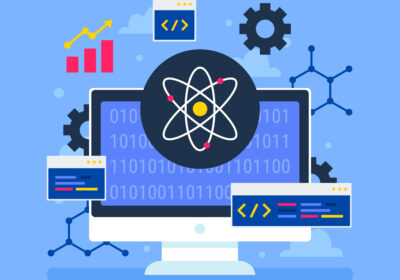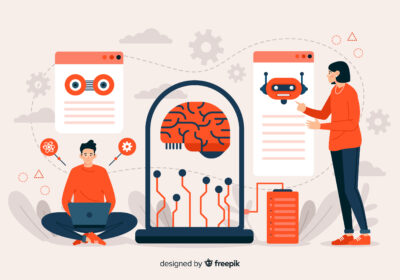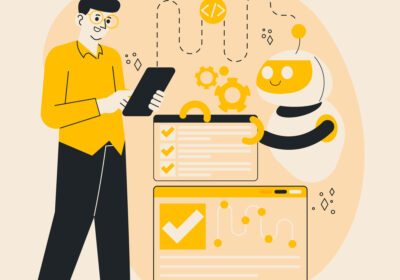Developer productivity has always been a hot topic — but in the age of AI, it’s evolving fast. From writing better code to eliminating repetitive tasks, artificial intelligence is rapidly becoming a developer’s best assistant.
But here’s the catch: improving productivity with AI isn’t just about adopting flashy tools. It’s about choosing the right AI capabilities, integrating them into the workflow, and making sure they genuinely save time and reduce friction.
Let’s explore how teams can practically boost developer productivity using AI — without sacrificing code quality or control.
1. Automate the Boring Stuff
Let’s start with the obvious. Developers spend a lot of time on repetitive, non-creative tasks: writing boilerplate code, formatting, setting up environments, or debugging common issues.
AI tools can now handle much of this, including:
-
Code generation and scaffolding
-
Linting and formatting suggestions
-
Basic test creation
-
Config file generation
Tools like GitHub Copilot, Tabnine, or Amazon CodeWhisperer suggest entire code blocks based on context — helping devs skip the dull parts and focus on logic.
Pro tip: Use AI to draft — not decide. Developers should still review and refine suggestions to maintain standards and security.
2. Improve Code Reviews With AI
Code reviews are critical for quality, but they can be time-consuming — especially for minor or repetitive issues.
AI-enhanced review tools can help by:
-
Highlighting potential bugs before the human reviewer even looks
-
Flagging security vulnerabilities using pattern recognition
-
Suggesting improvements based on project-specific style guides
-
Summarizing large pull requests
This gives reviewers more time to focus on architecture and business logic — not semicolons or indentation.
3. Debug Faster With AI Assistance
Debugging is where many hours disappear. AI can cut this time dramatically by:
-
Analyzing logs and pointing to likely causes
-
Suggesting fixes for known error patterns
-
Recommending changes based on previous successful fixes
-
Offering stack trace explanations in plain language
Instead of manually scouring Stack Overflow or GitHub issues, developers get contextual help, instantly.
4. Smart Documentation on the Fly
Writing documentation is often pushed to the end — or skipped altogether. But AI can change that.
With AI-powered documentation tools, developers can:
-
Auto-generate function and class descriptions
-
Translate code into human-readable summaries
-
Create API documentation from annotations or comments
-
Keep docs updated alongside code changes
This reduces the gap between code and understanding — which is especially useful for onboarding new team members.
5. Search Smarter, Not Harder
AI-enhanced search goes beyond simple keyword matching. Tools like Sourcegraph or AI-based IDE plugins understand code structure and context.
That means:
-
Smarter code navigation
-
Faster access to relevant examples
-
Better refactoring support
-
Cross-repository search with context
This saves developers from hunting through files or asking teammates for the fifth time, “Where is this function used?”
6. Support Continuous Learning
AI doesn’t just assist — it teaches. By offering contextual explanations, real-time tips, and alternative solutions, AI helps developers learn as they code.
This is especially useful for junior developers, who can:
-
Understand best practices without stopping to Google
-
Learn unfamiliar frameworks or libraries more efficiently
-
Avoid “copy-paste coding” without understanding the logic
7. Accelerate DevOps and CI/CD
AI can optimize pipelines, flag performance regressions, and even suggest configuration changes. In DevOps environments, AI boosts productivity by:
-
Predicting build failures before they happen
-
Analyzing test flakiness
-
Optimizing resource usage in cloud builds
-
Recommending deployment windows based on usage patterns
All of this means faster release cycles, fewer disruptions, and more time spent writing actual code.
The Productivity Mindset Shift
While AI offers powerful tools, it’s not about replacing developers — it’s about amplifying their capabilities.
Here’s how to make the most of it:
-
Start with one tool or area (e.g., code suggestions or AI-assisted reviews)
-
Train your team — don’t just “turn on” AI and hope for the best
-
Use AI to enhance judgment, not replace it
-
Continuously evaluate ROI — time saved vs. quality maintained
Final Thoughts
AI is not just a trend in software development — it’s a genuine shift in how we build, test, and ship products. The right use of AI can reduce bottlenecks, eliminate repetitive work, and give developers more room to focus on what they do best: solving problems.
By weaving AI into the daily workflow — thoughtfully and strategically — tech teams can unlock higher productivity, greater code quality, and faster delivery cycles.
And the best part? This is just the beginning.





